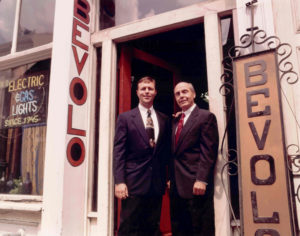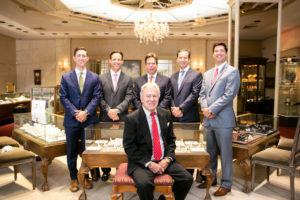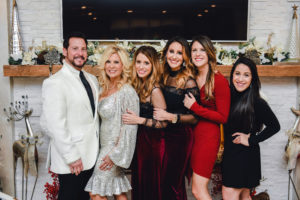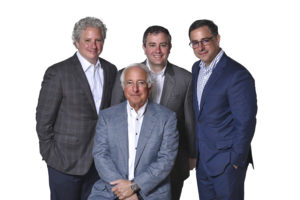Family Ties

Generational businesses all agree teamwork is what matters.
By Sue Strachan
CREATING—even creating on—a family business isn’t easy. Times change, as do expectations. Financial ups and downs, wars, man-made and natural disasters, as well as the COVID-19 pandemic have put pressure on businesses.
In New Orleans, there are a number of successful businesses that continue to thrive by utilizing its most valuable asset: family. In honor of Father’s Day, Inside New Orleans is profiling five family businesses: Bevolo Gas & Electric Lights, Boudreaux’s Jewelers, Al Copeland Investments, Lee Michaels Fine Jewelry, and Sensible Meals.
All have great stories to tell, but one consistent thing we did pick up on: It’s hard to take family vacations when you are always working!
Lighting the Way

After years of working for Ford Motor Co., Sikorsky Aircraft, and Higgins Industries, it was time for Andrew Bevolo Sr. to strike out on his own. It was 1945 when he opened Bevolo Metal Crafts in the French Quarter.
It was at this location that Louisiana architect A. Hayes Town stopped by asking if he could collaborate on a light fixture. The result was the iconic French Quarter Lamp, made of copper, brass and glass, with hand- riveted, instead of, soldered joints.
Since then, Bevolo has been manufacturing traditional, antique or custom designed handmade open flame copper lanterns, as well as electric ones. Many of its lanterns can be found on thousands of homes and buildings throughout the world, and have been featured in numerous publications.
Andrew’s grandson, Drew Bevolo, joined the company in 1989, after a career as a stockbroker in Baton Rouge. His uncle, Jimmy Bevolo, was running it by this time and was ready to teach the next generation.
“Jimmy was like a father to me. He taught me all he had learned while working with his father for 50 plus years,” says Drew.
The company website states that Drew’s Uncle Jimmy brought him in at $100 a week, “He insisted I start at the bottom. I did everything from welding to delivery. He was hard on me, and it was the greatest gift he could have given to me.”
Drew revamped the business, including changing the name to Bevolo Gas & Electric Lights, trained new artisans, expanded the number of light styles to more than 500, streamlined workflow, and opened new warehouses and manufacturing facilities, as well as showrooms.
There are four locations in the French Quarter to see Bevolo products: the Design Showroom at 521 Conti St.; Interior Collection at 318 Royal St.; Gas Light Museum and Shop at 316 Royal St. featuring his grandfather’s original worktable and two working coppersmiths; Vintage Lamp Showroom at 304 Royal Street; and a showroom in Mandeville. While the stores were not open during the COVID-19 pandemic, the sales and lighting team was available and working remotely.
Drew’s oldest son, Chris Bevolo, has joined the company. “Be old school, be humble and be proud of the work you do,” are among the lessons Drew says he is passing along to Chris.
What a Gem

It may have been 1933 and the middle of the Great Depression, but that didn’t stop Gilmore Boudreaux Sr. from opening a workshop in the Pere Marquette building in the CBD, to provide service and repair for businesses through the Gulf South. In 1940, Gilmore started making religious jewelry, having been authorized by the Archdiocese of New Orleans’ Chancery.
Sixteen years later, Boudreaux’s opened in the 100 block of Baronne Street, and Gilmore’s sons, Don, Louis and Gilmore, Jr. joined the company.
In 1985, Boudreaux’s moved from Baronne Street to Metairie, and now has additional locations in Mandeville and Baton Rouge. “All of our locations specialize in custom and designer jewelry, fine time pieces, and other full service repairs,” states Brandon Boudreaux, who is the lead designer and the fourth generation to be part of the company. His father, Brian Boudreaux, who joined the company in 1983, is now its president. Other family members include Brandon’s uncles Tommy Boudreaux and Donny Boudreaux, both vice-presidents, and his brother, Robert Boudreaux, who is the sales manager.
They have been involved with the business since they were children. “We worked wrapping presents at Christmas as kids. We also worked summers on the sales floor as high school and college students,” says Brandon. “Everyone with the exception of Donny, who owned a landscape architecture company first before joining the business, went straight into the jewelry business.”
Brandon sits across the desk from his father, which means he spends more time than most children do with their fathers. “New technology, design, and marketing have become a specialty of mine and my dad has years of experience managing the business that I do not yet have,” says Brandon. “We are very much alike in some ways, but we are from different eras, so it balances nicely.”
“My dad has always been someone who can keep things on even keel, no matter what is going on around him,” says Brandon. “His lightheartedness and jovial nature makes even the most stressful times fun.”
Grow and Prosper

Once Al Copeland Jr. decided to join the family company, he was all in, but was still nervous.
“There was a point in my life, around 1992, that I had to decide if I was going to spend it working under my father; I remember it well,” says Al. His father was Al Copeland, an entrepreneurial innovator in the restaurant business who founded Popeyes and was also known for powerboat racing, and the annual Christmas lighting display at his house.
Al points out that his father, who passed away in 2008 of Merkel cell carcinoma, started with no money and no education, and still became immensely successful.
“It was an opportunity to work as his right-hand man. It was the first position I felt like I wasn’t qualified to do. I had to hesitate for a minute. I knew there would be a large amount of accountability,” says Al. “I would require a lot of direct training from him and he agreed to train me.”
Today, Al is CEO and Chairman of the Board of Al Copeland Investments (ACI), a privately owned, multi-faceted management company, that operates the Al Copeland Family of Restaurants. What started in 1983, with Copeland’s of New Orleans, was followed by Diversified Foods & Seasonings (1984), a custom manufacturing operation serving over 10,000 locations with its custom dry blends and kettle cooked products. And prior to that, a hotel division (1978) which owns and operates over 500 rooms in the metro New Orleans area. (While Copeland no longer owns the Popeyes brand, Diversified Food and Seasonings, under the umbrella of Al Copeland Investments, still supplies the seasoning to Popeyes and retains some of its recipes. Al does own a few Popeyes restaurants in the New Orleans area.)
“I had the chance to learn from my father, be very close to him,” says Al.
“A lot of the family didn’t get as much time to be with him because he worked so hard and such long hours. I worked by his side daily. We were so close that I was the best man in his last wedding.”
Copeland Jr. has brought his daughters into the company: Allison Donnelly, vice president; Ariel Pierce, marketing manager and Alexandria Reuter, director of purchasing.
“My daughters are direct points of contact for me daily from conceiving ideas to fully facilitating leading into executing,” says Al. “They hold critical roles in our success, and I couldn’t be prouder.”
Ariel Pierce says his drive is contagious, and his “motivation and passion for the success of our family business is unbelievable. We often look back and find ourselves impressed by how he always managed to create quality family time, while holding such a demanding position in the company.”
Ariel admits working with family can be a challenge, the biggest “being able to balance family time. Often personal conversations can turn into work calls, but we try to maintain a distinction between the two settings.”
“It is a challenge that we have embraced and continue to overcome.”
She adds that growing up, it was hard to understand why their dad was always on the phone and unable to be at every event or function, although he was always there for the big moments.
“Flash forward years later, working with him and for him, it is crystal clear,” Ariel says. “His heart is big. He is our mentor, our inspiration, our boss and most importantly our father.”
The organization hit the ground running when the stay-at-order was issued. It immediately made the necessary changes to adapt. “We did daily specials to try to keep things interesting during this time,” says Copeland. The foundation also launched a new campaign “Be A Hero. Thank A Hero” as soon as they heard of what was happening during COVID-19.
“We needed to shift our focus of the Al Copeland Foundation to help fund those healthcare workers in need,” says Copeland. “We raised $100,000 in three weeks.”
Philanthropy has always been part of the family legacy: Al Copeland funded a number of education programs, and the Al Copeland Foundation was founded in 2008.
“When you talk about legacy it could not translate more than the Al Copeland Foundation. By 2018, right at 10 years from date of my father’s death, we found that treatment for the cancer that killed him.
“He had a dying wish to find a cure for the cancer that took his life. The Al Copeland Foundation supports new local cancer research, education and patient programs at the Copeland-LSU Health Science Center Partnership in Viruses, Cancer and Immunotherapy,” says Al. “Through this partnership, 48 patients have participated in 17 clinical trials and 3 patients are now tumor free.
“This groundbreaking treatment is saving lives and fulfilling a promise made to my dad to find a cure.”
Al adds: “Life on earth is short, it is important to ask yourself what you want your legacy to be. My father founded the companies that we operate today and for that I will always be grateful.
“We are very proud of his accomplishments and because his legacy is so important to me, it is important for me to develop these brands over time and into the future.”
Jewels of the Crown

“My father is an amazing merchandiser,” says Chad Berg, president of Lee Michaels Fine Jewelry. “He can look at any piece of jewelry, remember what he bought it for and what it was sold for. He has a photographic memory.”
His father, Lee Michael Berg, founded the company with his wife and Chad’s mother, Brenda, in 1978. Lee’s retail roots go back to when he worked at his grandfather’s business, Levine Department Store in Dallas, during high school. After Lee graduated from college and his grandfather sold the store to Zales, he was hired into Zales’ training program in New York City. He moved up the ladder quickly—in six years he was promoted to senior vice-president in charge of merchandising.
Lee wanted to have his own business. He quit his job and returned to Dallas to open a jewelry store. Unable to find the right location, the Bergs moved to Baton Rouge to open Lee’s first store. Today, Lee Michaels Fine Jewelry has nine locations: Metairie; Baton Rouge (two stores) Shreveport; Lafayette; San Antonio, Texas (two stores); Jackson, Miss.; and Albuquerque, N.M.
Lee is still CEO of the company but has handed over much of the business to his three sons: Chad, Ryan and Scott. All three are presidents in charge of specific regions: Chad, New Orleans, Jackson and Lafayette; Scott, Baton Rouge; and Ryan, Shreveport, San Antonio and Albuquerque.
“We have different operational responsibilities,” says Chad. “And we come together for merchandising, advertising and organizational efficiencies.”
“It is nice because there is space so we can do our own thing,” he adds. For example, merchandise is tailored to each store. Despite the physical distance between the brothers, they are in constant touch. “We speak a few times a week,” says Chad, adding, “We are on Zoom all the time.” During the time the stores were closed for the pandemic, they spoke for hours a day. The Bergs are focused on what the new normal looks like and have put in place many policies and procedures to ensure that when customers come in they feel they are in a safe and clean environment.
“During the COVID-19 pandemic, the company’s goal is to use the time off to allow their staff to study and learn the latest trends in the jewelry industry. They are what made us successful,” says Chad, noting that there are employees who have been with the company since it was founded.
“We are in the celebration and people business,” he adds.
The three sons have been working at the company since they were small children. And each bringing “Different talents to the company.”
Lee says that Chad is curious, “He wants to know what something is and always works at it until he figures it out,” adding, “He is a natural merchant.” Ryan “Doesn’t fit the mold. I admire that he looks at things differently and brings different ideas to the table. He is entrepreneurial.” Scott is “very business-oriented. He has a great mind for numbers, reading contracts and very good at sizing people up.”
“All three of them give me a tremendous pride and joy on how they work and interact together,” says Lee. “It’s not easy to have three siblings in one business, but the fact the they live in three cities and share equally in the management. They all look forward to growing and looking out for what is best for the company.”
Before the sons came aboard, there were strict requirements Lee set in place in what he called the “Family Charter.”
“It sets up the business and how a family member comes into the business,” Lee says. “They all have to get college degrees, become licensed gemologists, and work somewhere else for two years before they come into the company.”
Chad Berg hopes his children, 2- and 5-years-old, will eventually go into the business, making them the third generation.
“We want to continue to grow,” Chad says.
It all started with an idea

Ingrid Rinck is a classic American success story. A popular personal trainer for 20 years, she sympathized with her clients who were trying to eat right while juggling busy careers, social lives and home lives. As a single mom of three, she understood.
It was not until Ingrid’s son was diagnosed with type 1 diabetes, that she began to learn all she could about nutrition and adjusted her family’s diet accordingly. She subsequently lost 100 pounds and realized she could use that knowledge to help others, including her gym clients, by offering healthy, portion-controlled meals that were prepared and ready-to-eat. In 2014, Sensible Meals was born. (eatsensiblemeals.com)
Soon after, gym clients and other locals began enjoying Rinck’s portion-controlled (and delicious) meals, which are not only packed with nutrition but also fun foods. She says, “We have always focused on moderation, not deprivation. It’s about doing it right most of the time and having fun some of the time.” Ingrid’s client base began to grow as well as her team of chefs, sous chefs and meal preppers.
“After six months in business, it was growing so fast that I knew I needed to call in my father,” says Ingrid. An experienced CPA and businessman, Gary Rinck has over 50 years of restaurant experience.
“He owned fast food restaurants while I was growing up and I truly believe he helped turn Sensible Meals into a legitimate business.” As COO, Gary handles the company’s logistics while Ingrid handles marketing, working with clients, and continued innovation.
“We are very much the same person,” says Ingrid. “We have the same work ethic and drive.”
Six years later, they now has tens of thousands of clients across the country. And the demand gave this father-daughter duo the opportunity to start Rinck Packaging Inc. The 60,000 square-foot facility in Hammond is where the company is packaging and shipping the meals across the country.
This year, Rinck Packaging Inc. acquired three vacuum machines that seal the meals so tight that they don’t need preservatives and can be shipped in smaller containers. Ingrid says they are one of three companies that have the machines in the U.S., with a fourth machine on the way.
“Once it leaves the facility, your meal is sealed until you open it, which is an added benefit of safety during COVID-19,” says Ingrid.
The new company also packages and ships meals for restaurants, seafood companies, and even former competing meal prep companies. According to Ingrid, the owners have told her, “You have saved our livelihood,” referring to the loss of dining income restaurants have incurred during the COVID-19 pandemic. As of mid-May, the company is working with 21 local restaurants.
Ingrid strongly believes in philanthropy: Sensible Meals is a corporate sponsor for Juvenile Diabetes Research Foundation (JDRF) and Ingrid founded Leading Ladies League, a group of women who get together once a month—the luncheon is usually themed to make it fun—where members donate to a local woman.
“While donating to big charities is great, I thought it would be nice to raise money and help a woman right away,” says Ingrid. After two years, the league has more than 100 members.
Whether it is business or philanthropy, Ingrid credits her drive to her father.
“I began working with my father when I was 5 years old. Some of my first memories are filing receipts, making copies and binders, answering the phones,” reflects Ingrid. “He instilled in me a sense of business, and the right way to run a business, from a very young age.”
It was this early start working together that made it easy for this impressive family team to collaborate on Sensible Meals and Rinck Packing Inc. “We talk every day,” says Ingrid. “We have more of a friend and business partner relationship.
“I’m grateful to have my father running my company. I know that he’s loyal, honest and will always have my best interest in mind!”
For these businesses, family is an integral part of their identity. Teamwork, problem-solving, creativity, hard work and emphasizing a family member’s strengths create a recipe for success.




